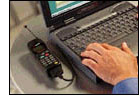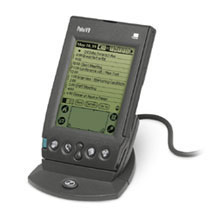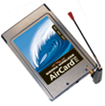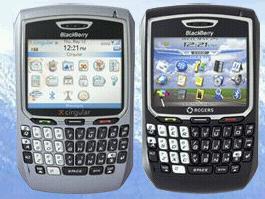You're Visitor #
Nothing here is copyrighted -- I'd be honored if you'd reuse anything here for your website
March 2012: Looks like the technology is passing me by. I've never used a Blackberry, Droid, or iPhone, but those and several others obviously provide sufficient internet access for those that can see the small screen and use the mini-keyboard. With that in mind, I'm going to stop updating the webphone and PDA sections of this page.
April 2006: There are internet options with most cell phones, but I haven't taken the time to check into them regarding cost, access speed, coverage, etc. As I get more info, I'll add it here and put a note in the news section on the main page.
The web phone that I've most often heard about is the Sprint PCS. As I understand it, you hook up with Sprint as your cell phone provider, then pay $10 per month extra for the internet access. I've perused their website and talked to Radio Shack salespeople, but haven't been able to get as much information as I'd hoped. It seems the $10/month allows you 30 web updates, but it's not clear what an update is. If it means 30 accesses per month, that's certainly not enough for anything that I do. Subsequent accesses get significantly more expensive.
The Sprint PCS Wireless Web Option is described as follows: "For $9.99 a month, you can add the Sprint PCS Wireless WebSM to your existing service plan of $29.99 or more. This Option lets you use your internet, and you get 30 Sprint PCS Wireless Web updates included. Each additional minute of Sprint PCS Wireless Web access costs $0.25. Each additional update costs $0.10." They also point out that the webphone can be used as a modem for a laptop as shown in the picture below. Click either the MiniBrowser or laptop picture to go to the PCS website.
Web Phones
Now I'm in an area that I know very little about. I've seen the advertisements with people doing email, shopping, and stock buying/selling on their webphone or Personal Data Assistant (PDA), but I've never personally used one. I haven't spent much time researching them because my general impression is that they're really intended as a "backup" to be used when your primary computer isn't accessible, rather than as a primary setup. The wireless card is new technology that looks very promising. Below, I've included what little I know about each and some links to additional information.
March 2012: Looks like the technology is passing me by in the WebPhone and PDA areas. I've never used a Blackberry, Droid, or iPhone, but those and several others obviously provide sufficient internet access for those that can see the small screen and use the mini-keyboard. With that in mind, I'm going to stop updating the webphone and PDA sections of this page.
March 2012: Looks like the technology is passing me by. I've never used a Blackberry, Droid, or iPhone, but those and several others obviously provide sufficient internet access for those that can see the small screen and use the mini-keyboard. With that in mind, I'm going to stop updating the webphone and PDA sections of this page.
I know less about PDAs than I do web phones. About the only one I've really read anything on is the Palm series. As I understand them, the unit costs around $300-$500, there's a monthly service fee, and you're charged for connection time. Looks to me like this would only be an option if money was no object and you need frequent, immediate access. Click the Palm VII to go check out their website.
April 2006: I've been hearing much about the handheld BlackBerry® device, which apparently isn't called a PDA, but looks like one to me. They're advertised as providing all-in-one mobile phone, email device, web browser and organizer. These appear to be the handheld of choice for most of the engineers and managers that I deal with. They come in a variety of models and a range of prices. Click the BlackBerry® image for detailed information.
PDAs

Internet-On-The-Road (IOTR)
Wireless Card
It's 2005 and I've only recently learned about the relatively new (to me, anyway), the Wireless Card. As I understand it, it's a card similar to a WiFi 802.11b card that works much like a cellphone. As my cousin describes it: "I use a wireless PCMIA/CDMA card from Verizon. I can get down load speeds to 1.54 Mbps anywhere there is cell phone access via a nationwide-broadband system. It reduces my cost to $60/month for unlimited national access."
I searched the Verizon site and found a page on Wireless Internet Broadband Access. Sounds like the card my cousin is talking about. I think the card costs in the $250 range, but there are always rebates so who knows what the bottom line is. In addition, I'm sure this "new technology" will continue to drop in price to be competitive with alternative access methods.
Another card I found through an internet search is the Sierra Wireless card. Sounds similar to the Verizon card and it appears they have various types that serve different wireless providers.
More info here later as I learn more about this option.
July 2006: In July, I finally decided it was time to get a wireless card. I was in a park with no internet service for a month and couldn’t do without it for that long. For my money, the wireless card is the best deal monetarily, if you want continuous access and you're not overly hung-up on speed. I've found mine to be about 3-4 times faster than dialup and significantly slower than most Broadband services.
So, which wireless card is the best deal? Well, these deals will obviously change over time, but here's how things were August, 2006. Cingular charges $200 minus a $100 rebate for the card and $60/month for unlimited access. Since I really hate rebates and try to avoid them as much as possible, this one didn't turn me on at all. I went down to Verizon and found that they give the card free and also charge $60/month for unlimited. I signed up immediately. I later saw a Sprint ad on TV, offering the card for $49.95, so I'm thinking that maybe I got the best deal - for a change. I think they all use the same Sierra card and all are offering about the same speed, so it looks to me like the only variables are cost and coverage. I've heard from several people that the coverage on Cingular isn't great (might be better, now that they've merged with AT&T) and that Sprint pretty much only works near Interstate Highways. They all three also (HERE'S THE BAD NEWS) sign you up for a 2-year contract, so this isn't a great option for someone (like me) that isn't on the road alot. I still did it, though, because I'm tired of trying to search out WiFi whenever I go to camp. I've long since decided that I won't be using those "dialup in the clubhouse" options anymore, so it's pretty much been WiFi or nothing. By the way, the Verizon card also has a WiFi option and will notify you if there's a WiFi HotSpot around, so you can use that higher speed if you like.
February 2007: The card has worked almost everywhere that I've tried it and is a great substitute when WiFi isn't available. One of the downsides that I mentioned was that you're under contract to pay $60 a month for two years. Recently, I learned that they have a "deactivate" option that allows you to turn the card off for up to 90 days. It costs $15 to turn off and $15 to turn back on, but that's still a savings over the $60/month if you leave it off for at least a month. They then add that time on the end of your contract, which is fine with me.
I've also learned that there's an option to pay more for your card and get higher speeds. I think the monthly charge is still the same, just the initial outlay for the card is more.
January 2011: I just learned that they have options for prepaid wireless cards. Not sure what everyone is offering, but I checked Verizon. It's $100 for the card, $35 for "setup", and $50/month for 1GB of service. Not sure how much you can do for 1GB, but I'd guess you'd be fine as long as you limit the number of videos and movies. Actually, at the speed you get from wireless cards, videos and movies would probably be difficult to watch. Once you sign up, you pay for months that you want it and don't if you don't.




